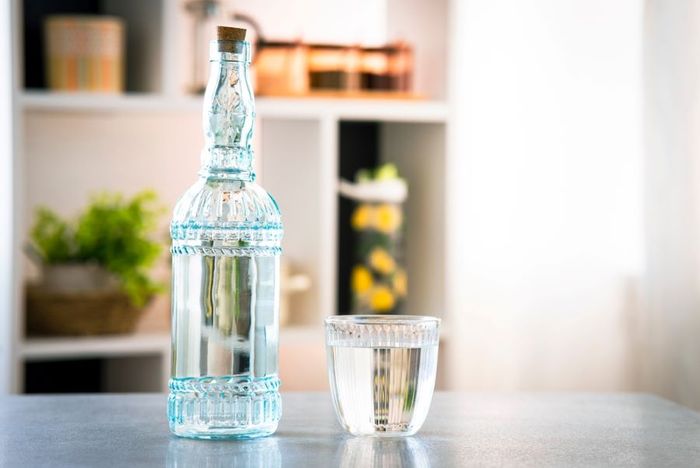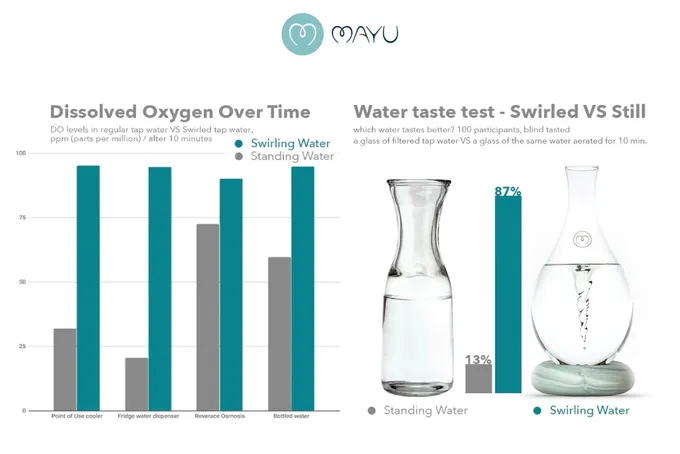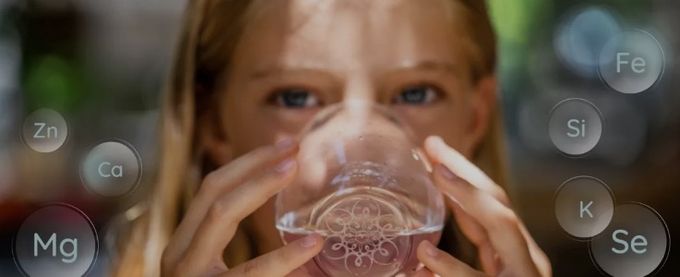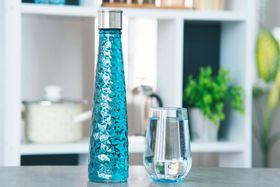Not All Water Is Equal: 7 Healthiest Types of Water to Drink
Wondering what is the best water to drink? Explore the healthiest water types and find out why not all water is equal when it comes to nourishing our bodies.
Updated November 21, 2024.

Water is critical for keeping our bodies functioning properly, making up 60% of the human body. Every cell, tissue, muscle, and system requires water to run effectively. Therefore, water is the key to all our biological processes.
Though water is essential for our well-being, not all water is equally good for us. The existence of different water types can make it overwhelming to know which one is the best to drink. They vary in nutritional benefits and caloric intake, so let’s take a closer look at which is the healthiest and best water for optimal hydration and overall health.
7 Healthiest Drinking Water Types
- Best Overall: Structured Water
- Most Convenient and Economical: Tap Water
- Best Mineral Enrichment: Mineral Water
- Most Pristine Source: Spring or Glacier Water
- Purest, Contaminant-Free Form: Distilled Water
- Best pH Balancing and Alkalizing Properties: Alkaline Water
- Most High-Quality Filtration and Impurity Removal: Purified Water
What Is the Best Water to Drink: Comparing Water Types
When it comes to the healthiest water to drink, we first need to discuss the pros and cons of the seven different types of drinking water.
1. Structured Water
Best Overall
Structured water, also called hexagonal water, is water with a structure that has been altered to form a hexagonal molecule cluster. It's believed that highly structured water, also known as H3O2 (living water), shares similarities with water that has not been contaminated by human processes.
Pros
- Molecules are charged, so they hold energy and recharge and hydrate the body better
- Long-lasting hydration
Cons
- Needs further studies on its difficult accessibility
Brace for Our Biggest Black Friday Deals Yet:
Why Is Structured Water the Best Water to Drink?
Structured water is the best to drink due to its purported ability to have a more organized molecular structure, better hydration properties, and improved bioavailability.
To better understand why structured water is the healthiest water to drink, here is a short comparison between unstructured and H3O2 structured water.
Structured Water
- Has higher alkalinity levels
- Water molecules are more easily absorbed in the cells, making it better for hydration
- Structured water is soft and more energized
Unstructured Water
- Has a balanced pH of 7
- Water molecule shape may not be as effective for cell absorption and may cause dehydration
- The body isn't gaining energy from water
The oxygen within structured water is more readily available for absorption and utilization by the body.
2. Tap Water
Most Convenient and Economical
Tap water goes through different purification methods using purifying agents such as chlorine and ozone before it makes it to your tap. Although these agents are useful for removing bacteria, pathogens, and contaminants, they also strip its nutrients from it.
Pros
- High purification
- Contains dissolved minerals and electrolytes
- Cheap and readily available
- Eco-friendly
Cons
- Lack of nutrients
- Distinct odor or taste (chlorine)
- Could contain harmful compounds, like microplastics and high chlorine levels
Does tap water have electrolytes?
It depends on how many purification processes are done. It is generally considered to contain electrolytes and dissolved minerals, but the best course of action is to add essential mineral drops to your tap water to ensure you get its mineral-rich benefits.
3. Mineral Water
Best Mineral Enrichment
Mineral water is abundant in essential nutrients like sulfur, magnesium, and calcium. This type of water comes from underground sources, i.e., protected underground mineral springs.
Some of the benefits of this kind of water are that it supplies the body with electrolytes needed for hydration, lowers blood pressure, and works wonders for your muscles and bones. It is important to note that the recommended mineral content in mineral water is at least 250 parts per million of mineral solvents.
Pros
- High mineral content
- Lowers blood pressure, boosts muscle growth, and improves bone density
Cons
- Some brands have high levels of sodium, which can be harmful to kidney function
- Can be an expensive option
4. Spring or Glacier Water
Most Pristine Source
Spring or glacier water claims to be bottled at the source from where the water flows. This water is typically clean, organic, free from any treatment or toxins, and high in minerals.
If you are wondering what the difference is between spring water and purified water, the answer is simple—spring water is naturally filtered underground, while purified water undergoes filtration and purification processes to remove contaminants and impurities using harmful agents such as chlorine.
Pros
- Comes straight from the source
- Unlikely to contain contaminants
- Contains good levels of essential minerals
- Refreshing, crisp taste
Cons
- Could still contain contaminants like metals, nitrates, and bacteria
- Can be more expensive than regular tap water
5. Distilled Water
Purest, Contaminant-Free Form
Distilled water is a type of water that is purified by boiling it, turning it into a vapor, capturing the gas, and condensing it back to a liquid state.
Is distilled water safe to drink?
Yes. It undergoes purification processes that remove contaminants like sulfur and sodium.
So, can you drink distilled water every day? Well, the answer is not that simple—though it is safe to drink, the purification of distilled water removes all vitamins and minerals, making it lose its long-term hydrating ability as well as taste. However, you can always add essential minerals to improve its quality. Drinking water low in minerals is detrimental to your health, thus adding Mayu Essential Minerals will ensure you’re drinking nutrient-rich, healthy water.
Pros
- Good option if your tap water contains chemicals or pollutants
Cons
- No vitamins and minerals, which could negatively affect your health through mineral leaching
6. Alkaline Water
Best pH Balancing and Alkalizing Properties
Water with alkaline properties is typically sourced from areas near mineral-rich volcanos.
Alkaline water contains ionized minerals that elevate its pH to 8 or 9, which is higher than normal tap water with a neutral pH of 7, making it less acidic compared to other types of water.
Alkaline water is one of the healthiest water to drink as it contains minerals that help protect the body from free radicals, which are usually linked to numerous chronic diseases and inflammation.
However, it is important to keep in mind that alkaline water may have side effects; consuming too much of it may lower pH levels in the body, which can weaken the immune system and bones.
Pros
- Higher body hydration better than regular bottled or tap water
- May help protect the body from free radicals
- May help distribute oxygen more effectively in the body
Cons
- More research is needed to confirm its health benefits
- Could change stomach acid levels, which could cause discomfort
- Could lower pH levels in the body
- Most off-the-shelf brands artificially reduce the acidity of alkaline water
Most alkaline water available in stores does not come from natural sources—although there are places in the world with naturally occurring alkaline water. Many of these commercially bottled brands use tap water and a process called electrolysis to reduce acidity artificially.
7. Purified Water
Most High-Quality Filtration and Impurity Removal
Purified water is typically tap or groundwater that has been treated to remove harmful substances like bacteria, parasites, and other impurities, making it suitable for use. Nowadays, this type of water is purified by various processes, including carbon filtering, microfiltration, capacitive deionization, and reverse osmosis.
Purified water is a safe option if water sources in your area are contaminated. However, purification strips the water of minerals and electrolytes that our bodies need. Thus, it's best to remineralize purified water or add electrolyte drops for optimum and safe hydration.
Pros
- A good option if your primary water sources are contaminated
Cons
- Doesn't contain minerals or electrolytes the body needs
Did you know? About 20% of daily fluid intake usually comes from food. The remaining 80% comes from drinks.
How to Choose the Right Water for You
When choosing the right water for you, the most important thing to take into consideration is the composition of water, i.e., that all elements and minerals act synergistically.
Here are some questions to ask yourself before making the decision:
- What does the water taste like? Do I like the taste?
- Does it contain necessary essential minerals and electrolytes?
- How much is it going to cost monthly/yearly?
- Is it easy and convenient for me to drink?
Balancing the Pros and Cons
There are pros and cons for each type of water, so let's sum it up.
- Tap water is the most convenient and cost-effective type of water to drink, but it may contain harmful chemicals and pollutants.
- Mineral, structured, and pure spring water are some of the healthiest water you can drink because they're clean and contain all the essential minerals your body needs.
- Filtered water removes contaminants but might also remove essential minerals. However, there is the option of adding essential minerals and electrolytes back into your drinking water.
Considering everything, it is safe to say that the most important thing is drinking enough water to keep your body hydrated, which is the core of the body's function. Choose the right type that suits your lifestyle and tastes the best to you, and be sure to add essential minerals and electrolytes if necessary.
FAQs
How much water should you drink every day?
According to Mayo Clinic, 8 glasses of water a day is a reasonable goal, which is around 2 liters or half a gallon. But, more specifically, an adequate daily fluid intake for an average, healthy adult is:
- About 15.5 cups (3.7 liters) of fluids a day for men
- About 11.5 cups (2.7 liters) of fluids a day for women
These recommendations cover fluids from water, other beverages, and food.
How to drink more water
- Carry a water bottle with you wherever you go, so it's always within reach.
- Set reminders on your phone or use an app to prompt you to drink water throughout the day.
- Keep track of your water intake in a journal or an app to stay accountable.
- Drink a glass of water before each meal.
- Flavor your water with fruits or herbs to make it more enticing.
- Set a goal for how much water you want to drink each day and work towards it gradually.
Staying hydrated is important for your overall health, so finding ways to drink more water can be beneficial, especially when you’re drinking the healthiest water—structured water.
Should you avoid certain types of water?
Here are some unsafe water types that are generally best to avoid:
- Water from unknown or unreliable sources, or water that has been contaminated by pollutants, should be avoided as it is unsafe and can cause illness.
- Unpurified tap water in certain regions may not be safe to drink without purification due to potential contamination with bacteria, parasites, or other harmful substances. It's important to be aware of the water quality in the region you are in and take necessary precautions.
- Water that has been sitting for a long time or has become stagnant may contain higher levels of bacteria or other contaminants, so it's best to avoid drinking it.
- While slightly alkaline water is generally safe to drink, artificial alkaline water can disrupt the body's natural pH balance and may contain contaminants, making it not suitable for regular consumption.
Does water have a taste?
Yes, water does have a taste, and not all water tastes the same. The taste of water can be influenced by factors such as the minerals dissolved in it, the source of the water, and individual biological differences. The minerals present in water, such as calcium, magnesium, and others, can affect its taste. Additionally, taste receptors in our bodies can perceive certain qualities in water, such as sourness. So, while the taste of water may be subtle, it is indeed present and can vary depending on these factors.
























